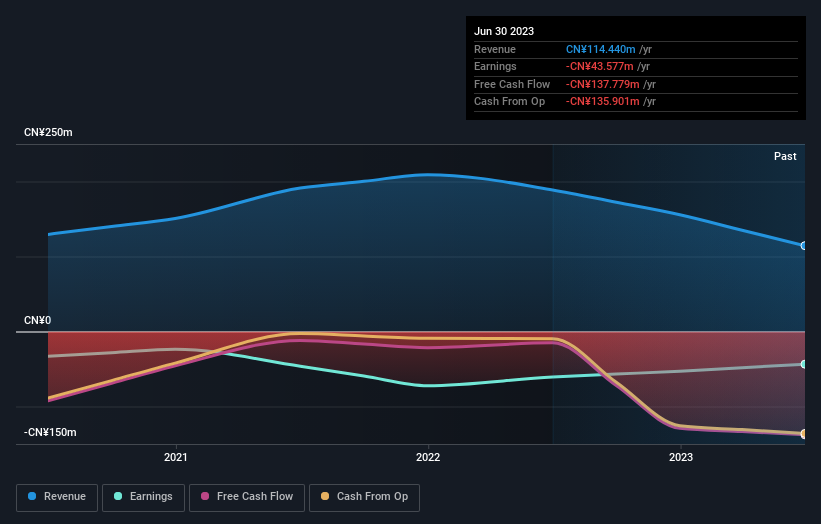Puyi Inc. (NASDAQ:PUYI) insiders, who hold 88% of the firm would be disappointed by the recent pullback
Key Insights
Puyi's significant insider ownership suggests inherent interests in company's expansion
The largest shareholder of the company is Haifeng Yu with a 88% stake
Past performance of a company along with ownership data serve to give a strong idea about prospects for a business
Every investor in Puyi Inc. (NASDAQ:PUYI) should be aware of the most powerful shareholder groups. With 88% stake, individual insiders possess the maximum shares in the company. That is, the group stands to benefit the most if the stock rises (or lose the most if there is a downturn).
And following last week's 20% decline in share price, insiders suffered the most losses.
Let's take a closer look to see what the different types of shareholders can tell us about Puyi.
See our latest analysis for Puyi
What Does The Lack Of Institutional Ownership Tell Us About Puyi?
We don't tend to see institutional investors holding stock of companies that are very risky, thinly traded, or very small. Though we do sometimes see large companies without institutions on the register, it's not particularly common.
There could be various reasons why no institutions own shares in a company. Typically, small, newly listed companies don't attract much attention from fund managers, because it would not be possible for large fund managers to build a meaningful position in the company. It is also possible that fund managers don't own the stock because they aren't convinced it will perform well. Puyi might not have the sort of past performance institutions are looking for, or perhaps they simply have not studied the business closely.
We note that hedge funds don't have a meaningful investment in Puyi. Looking at our data, we can see that the largest shareholder is Haifeng Yu with 88% of shares outstanding. This implies that they have majority interest control of the future of the company. With 0.02% and 0.02% of the shares outstanding respectively, Rhumbline Advisers Ltd Partnership and Geode Capital Management, LLC are the second and third largest shareholders.
Researching institutional ownership is a good way to gauge and filter a stock's expected performance. The same can be achieved by studying analyst sentiments. We're not picking up on any analyst coverage of the stock at the moment, so the company is unlikely to be widely held.
Insider Ownership Of Puyi
The definition of an insider can differ slightly between different countries, but members of the board of directors always count. Management ultimately answers to the board. However, it is not uncommon for managers to be executive board members, especially if they are a founder or the CEO.
Most consider insider ownership a positive because it can indicate the board is well aligned with other shareholders. However, on some occasions too much power is concentrated within this group.
Our information suggests that insiders own more than half of Puyi Inc.. This gives them effective control of the company. Given it has a market cap of US$229m, that means they have US$200m worth of shares. It is good to see this level of investment. You can check here to see if those insiders have been buying recently.
General Public Ownership
With a 12% ownership, the general public, mostly comprising of individual investors, have some degree of sway over Puyi. This size of ownership, while considerable, may not be enough to change company policy if the decision is not in sync with other large shareholders.
Next Steps:
I find it very interesting to look at who exactly owns a company. But to truly gain insight, we need to consider other information, too. Like risks, for instance. Every company has them, and we've spotted 3 warning signs for Puyi (of which 2 are concerning!) you should know about.
If you would prefer check out another company -- one with potentially superior financials -- then do not miss this free list of interesting companies, backed by strong financial data.
NB: Figures in this article are calculated using data from the last twelve months, which refer to the 12-month period ending on the last date of the month the financial statement is dated. This may not be consistent with full year annual report figures.
Have feedback on this article? Concerned about the content? Get in touch with us directly. Alternatively, email editorial-team (at) simplywallst.com.
This article by Simply Wall St is general in nature. We provide commentary based on historical data and analyst forecasts only using an unbiased methodology and our articles are not intended to be financial advice. It does not constitute a recommendation to buy or sell any stock, and does not take account of your objectives, or your financial situation. We aim to bring you long-term focused analysis driven by fundamental data. Note that our analysis may not factor in the latest price-sensitive company announcements or qualitative material. Simply Wall St has no position in any stocks mentioned.

 Yahoo Finance
Yahoo Finance 

